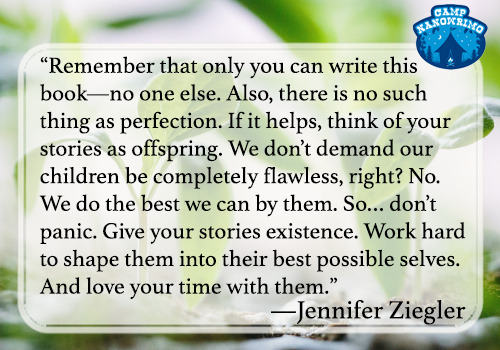Chris Baty's Blog, page 58
April 30, 2020
Camp Pep Talk: You Can Do This!

Sometimes we can get the urge to rush through as fast as possible to meet our word count goals.Young Writers Program participant Lily reminds us today that’s okay to take a few moments to slow down and connect with others before picking our writing back up again.
Hello writer!
I heard you want to write a novel. That’s great! All you need is time and effort. Willing to put in the effort but feel too busy? That’s ok. You can either write when you do have free time, or clear unimportant things from your schedule to make time. Have time but can’t focus due to people being really loud? That’s ok too! Just ask them to be quieter.
Anyone can write a novel, but not everyone is willing to make it happen. And since you’re writing one, you are part of that category of go-getters. You can do this! I’m always here if you need to talk about your novel. If you don’t finish by the end of April, that’s ok. You can still work on it afterwards.
Speaking of not finishing, you never need to rush. You can try if you want, but you don’t have to. Even if you feel like you can’t work on it at the moment, you can always come back to it later.
Or not. It’s all up to you. You have the power to create something beautiful. I recommend you use it to create wonderful stories. Oh, I’m blabbering again.
All in all, don’t give up. You have people who support you and love your work. You don’t have to finish it if you feel you can’t. I hope you do, though, because I would love to read it. You can do this! We’re all here for you. The mods especially can help answer any of your questions because they are the ones in charge and can tell you what’s allowed and what’s not. They are also amazing people and will give you lots of encouragement if you need it!
If you still need help, try looking for people who are writing the same genre as you and asking them. For example, if I needed help, I would ask my friends who are currently writing fanfics. That way, I get the best answers. I promise you it will work.
Well…now that I discussed that, I don’t know how to finish this off. If I repeated anything, that’s because it’s very important. Guess writer’s block took me over as I was typing this. I hope you have better luck than I do. Until the next time we see each other, may the force be with you and good luck.
—Lily

Lily is a young writer who is currently working on an alternate universe for her fandom. She is stuck in quarantine like many other people her age and is planning on spending that time on Animal Crossing. She also spends her time playing Sonic games because she likes it a lot. She wishes that people were more loving so she’s trying really hard to be nice to a lot of people. She loves kids, makes sense seeing how she is the oldest of 8.
Top photo by Morgan Sessions on Unsplash
April 29, 2020
6 Factors That Can Influence Your Writing

Have you ever considered how the environment you write in can affect the tone of your stories? Well pull up a chair and get comfortable! Young Writers Program participant Sarah R. is here to share how we can use our environments to suit our writing needs.
Environments can greatly influence how you write. They can determine if you write poetry or a mystery novel. Or if your writing is romantic and heartfelt or thrilling and spooky. Here’s a list of a few environmental factors that may give you ideas or help you dive into your writing:
1. Your HomeFirst off, the home you were (or are currently being) raised in can influence how you write. You may have been raised in a family that has traveled around the world since you were a baby, or maybe you’ve lived in the same house your entire life. Either way, it affects the way you write.
I lived in Costa Rica for 11-12 months of my life. I remember it. I remember missing my friends and family, but I also remember how exciting and nerve-racking it was to move. Just like if you lived in the same house you may remember how boring or how peaceful it was. You can work all of these feelings
into your story.
Online environments can influence your writing too. Let’s use NaNoWriMo as an example. When you’re on NaNoWriMo you may feel more inspired to write since you’re around other writers. You can find the inspiration you needed to continue writing, which could affect what your entire story is about.
Maybe while you were online you found an idea to implement into your story. When you add that it makes the story different from what it would have been if you’d never found the idea. What we see, hear, and talk about online can influence what we write and how we write it.
3. Your Writing SpaceEven where we write can influence our writing. Maybe sitting at your desk with open windows and a slight breeze helps you write. Maybe sitting in the middle of the kitchen floor helps you write (although I wouldn’t recommend doing this as you may get in the way). Making your writing space comfortable to write in is key. If you’re uncomfortable, it could decrease your desire to write. So, make your space comfortable and inviting.
4. Your Friends and FamilyFriends, family, and online communities can help you when you run out of inspiration. All you have to do is ask someone and they can give you some sort of inspiration—even if it’s not straight forward or obvious. Some inspiration just comes for situations that you’re in. So, examine what situation you’re in an
implement that into your story, whether you’re in quarantine or you’re on vacation.
The music you play (if any) can influence how you write. If you play slow melodies it can help you write calm or romantic scenes. If you play hip-hop or action music it can help you write fight, action, and/or argument scenes. If you don’t play any music, sounds of birds chirping, trees rustling, and crashing
waves can help give you inspiration and help you write scenes.
The sounds and sights around you can influence what you write, but who you’re around can influence your writing too. If you’re around people that are always excited, even about the little things, and are always happy, your writing may give off a cheerful and energetic vibe. If you’re around people that aren’t
always happy and are struggling, your writing may give off more of a sad and lost vibe. You can utilize the feelings that people around you have and the feelings you have to make your story more realistic.
In the end, make sure you utilize the space you write in well. If you like to listen to music, consider the scene(s) you’re going to be writing and pick music keeping the scene(s) in mind. Find somewhere comfortable to sit, whether that’s your bed, a giant beanbag, or your desk chair. Just make sure you’re comfortable and happy with your writing space.

Sarah R. is a writer and blogger from Missouri. In her free time, you can find her writing, reading, scrolling through Pinterest, or laughing her head off at something that really wasn’t that funny. She enjoys writing fantasy and romance the most and she is working on a couple of writing projects right now. She hopes to publish a novel someday. Aside from reading and writing, you can occasionally find her taking photos, making videos, or baking.
Top photo by Amy Humphries on Unsplash
April 28, 2020
"Imagery is a very powerful writing tool, especially when you are nearing the end of a story. Look..."
-
Dallas Woodburn is the author of the linked short story collection Woman, Running Late, in a Dress and the novel The Best Week That Never Happened. Her work has been honored with the Cypress & Pine Short Fiction Award, the international Glass Woman Prize, and four Pushcart Prize nominations. She hosts the podcast “Overflowing Bookshelves” and heads the organization Write On! Books that empowers youth through reading and writing endeavors. Dallas lives in the San Francisco Bay Area with her husband and daughter.
Your Camp Care Package is brought to you by Camp NaNoWriMo. Sign up to receive more Camp Care Packages at nanowrimo.org!
April 27, 2020
Camp Pep: Beating Procrastination & Writer’s Block

With this year’s Camp Pep Talks all written by Young Writers Program participants, we’re happy to introduce you all to Hannah. She’s here with us today to offer some encouragement and share a few strategies on overcoming procrastination & writer’s block.
I’m not going to lie, writing is hard. I’m sure we all know that by now. There are so many things that can get in the way of us writers just sitting down and getting those words on the page. The four main ones, at least for me, are procrastination (“But right now I just wanna watch Grey’s Anatomy!”), Writer’s Block (staring at a blank page and wondering “How on earth do I write?” is part of the process), prior responsibilities (work, school, family, etc.), and the need for sleep (coffee might help a little, but in the end you can’t get around this one).
Besides prior responsibilities and the whole sleep thing, I’ve found ways to fix most of the other things that get in the way of writing. As long as I’m willing to put in the effort. So I’m going to share my tips with you.
1. ProcrastinationThe only way to stop procrastinating… is to stop procrastinating. Set a timer if you have to: “In ten minutes I’m going to stop playing video games, and write for an hour.” Sometimes even that doesn’t work. And if it doesn’t, get up, close the tab, open your notebook or document. Often for me, the best way to stop doing what I’m doing that’s preventing me from writing, is to X out of the tab. Something final that would take more than 2 seconds to undo. Do not undo it. Then start writing!
2. Writer’s BlockWriter’s Block often comes across as something impossible, and that the only thing to do is to wait for inspiration to hit. But that’s not the case. An overall thing that I’ve found helps me, is to plot out the story. I never bother going into much detail, basically just a short sentence per chapter/scene/event. Map out the three acts into chapters so you make sure to get in enough actual plot, instead of just having your inciting incident, a bunch of fluff, and climax.
Plotting doesn’t always solve Writer’s Block. Sometimes it isn’t that you don’t know what happens next, it’s that you don’t know how to write what happens next. The question I always ask myself is if I know how to write the next sentence. Can I think of the words of the next sentence? If I can’t, I figure it out, and if so, I write it. Then I repeat until I’ve escaped Writer’s Block, and the words are flowing faster than I can type.
The last piece of advice I have, is to write what you want to write, when you want to write. As in, if it’s 3 AM and you want to write a Lord of the Rings fan fiction, I highly suggest you do so. Even if it’s not the thing you wish you were writing, and you never plan on sharing it, you should write it because it will make you a better writer. Every time you write, you become better at it. That’s why even if you think your writing is trash, it has value. And writing when you want to write is especially important. Otherwise, your procrastination causes Writer’s Block and you’re back at square one.
Keep writing, folks.

Hannah is a 16 year old writer who has grown up in the Pacific Northwest. She loves cheese, wearing a neck-tie, the outdoors, fuzzy blankets, and her characters. She is fascinated by architecture of all sorts, from haunted looking second empire houses, to modern designs. She aspires to be a professional author as her career. She is a headstrong pun lover who’s not afraid to fight for what she believes in.
Top photo by Angelina Litvin on Unsplash
April 24, 2020
Camp Pep: Be More Stubborn Than Your Muse

April’s nearly over, but does the finish line still feel far away? It’s okay! Young Writers Program participant Wafaa has written a Pep Talk to help you push through!
We writers are a pretty ambitious bunch. Whether it’s being published, changing the world, or just writing a decent story you seek, it’s a difficult task you assign to yourself. Which is why it can sometimes feel futile! And hopeless! And difficult! We’re well into Camp by now, and you’ve probably hit your slumps and high points and might be starting to feel some sense of weariness settling in.
I am now here to tell you: there is hope! Your goals aren’t quite as unattainable as they seem. In fact, if you want to achieve them, there’s actually this simple little tool — with massive effects — that you should be using.
This is the single greatest thing you can do for your goals and ambitions. You’ll have heard of it before. But stick with me for a moment; it’s important enough that you might need to hear it again.
The key is consistency.
Before you start complaining, let me ask you a question. Haven’t you ever wished you could just call upon inspiration at will? That you could just sit down bubbling with energy and enthusiasm every day? How easy writing would be then. What brilliant, devoted writers we would be.
But unfortunately, that’s not how we work. As writers, we all have this little muse. This is what compels us to write, what bursts out of nowhere at the most inconvenient times, flooding us with glorious inspiration. It’s beautiful. But it’s also very unpredictable. We can’t force it to work with us at will.
So why is this relevant? Why should you care? Well, you should care because although we can’t control our muse, there is something else we can do. Something better, I would argue.
“We’ll learn to write when we don’t feel like it. We’ll learn to be independent of this muse. We’ll also make it easier for this muse to express itself.”We can sit down. We can write. We can work hard. And we can be consistent with what we do.
What will happen then? We’ll learn to push through. We’ll learn to write when we don’t feel like it. We’ll learn to be independent of this muse. We’ll also make it easier for this muse to express itself.
When you’re writing consistently, when you’ve been writing, inspiration is more likely to come. Once you can make yourself to write, once you can work hard and get something out — once you’re in charge, you can almost force this part of you to submit. Key word: almost. It’s better than nothing.
Let’s be honest here: while you may write your best in the grip of this fey muse, it’s not actually going to get you anywhere. You’ll scribble something once a month. Return a year later. But if you work hard and consistently? Not only will it strike more often, but you’ll be improving in the meantime as well. You’ll be gaining skills. Ultimately, your brilliance will come from hard work and perseverance, not this writer’s muse.
So. Develop a habit. Stick with it. Be stubborn, more stubborn than your muse.
You must have heard about the power of words. It’s so real. There’s so much potential, so much power, so much beauty and magic at your fingertips. It just needs to be seized. Don’t wait for this fickle muse to strike. Go forward yourself. Gather it up. It probably will be slow, painful, and tiring. But it will be so, so worth it. One day you’ll find you’ve come farther than you ever thought you would.
There’s an Arabic saying: consistency is the greatest miracle. So now it’s up to you to go forward and make that miracle happen.
Best of luck to you, writer.

Wafaa is an avid reader and writer on a grand journey to figure out how writing works. She has high aspirations and hopes to get published someday, when she’s learned to write well. She has a love for fantasy, whimsy, and all things beautiful. When not writing or doing schoolwork, she may be found enjoying life with the closest friends she has: her books, her cats, and her characters.
Top photo by Steve Johnson on Unsplash
April 23, 2020
“Remember that only you can write this book—no one else. Also,...

“Remember that only you can write this book—no one else. Also, there is no such thing as perfection. If it helps, think of your stories as offspring. We don’t demand our children be completely flawless, right? No. We do the best we can by them. So… don’t panic. Give your stories existence. Work hard tot shape them into their best possible selves. And love your time with them.”
—Jennifer Ziegler is an author of quirky, contemporary middle grade and young adult fiction, including such titles as How Not to Be Popular, Sass and Serendipity, and Revenge of the Flower Girls. Her books have been featured on the Lone Star List, the International Reading Association’s Young Adults Choice list, recommended on NPR’s “Tell Me More,” and optioned for film. Jennifer serves on the faculty of Vermont College of Fine Arts’ MFA program on Writing for Children and Young Adults.
Your Camp Care Package is brought to you by Camp NaNoWriMo. Sign up to receive more Camp Care Packages at nanowrimo.org!
Background photo image by Francesco Gallarotti on Unsplash.
April 22, 2020
How Wattpad Can Help You Find Your Writing Voice

Every year, we’re lucky to have great sponsors for our nonprofit events. Today, Marianna Leal, a NaNoWriMo writer and Wattpad Star, shares how these two platforms helped her with her writing. Wattpad is a NaNoWriMo 2020 sponsor.
A friend encouraged me to join Wattpad two years ago by explaining how engaging the community is. Interacting with her thousands of readers motivated her to write and post more, which in turn led to more readers. The feedback cycle intrigued me, and since I needed something positive to keep me grounded during a hard time, I decided to try.
It is no exaggeration to say it changed my life.
After years of struggling with writing for an audience of one, I suddenly had tens of people interested in what would happen to my characters. Those tens became hundreds. Now they are thousands. With an audience that reads my work and emotes in real time, I see the impact my words can have in the emotions and thoughts of my readers. A new aspect of the cycle became apparent to me: the more feedback I received from them, the more stories I wanted to give them.
That was when I realized NaNoWriMo had the key to achieve this. With a major event every November and two Camp NaNoWriMo sessions in the summer, if I could grasp the creative energy around them and channel them into my work, I would be able to increase my productivity on Wattpad.
Decision made, I went into NaNoWriMo that first year with the relentless determination of a freight train. I only stopped writing when I hit my destination: a finished novel at a cool 80k words. Then in the following year, in 2019, I participated in April’s Camp NaNoWriMo, where I blew past my 30k words goal and finished another novel. And I did it again in July, where Camp NaNoWriMo also helped me finish a third novel. Every time I finished a book I took some time to do a first pass edit and post it on Wattpad, where my trustworthy updates helped my readers feel confident in my work and take a chance on it. I started to see a rapid increase in engagement and vowed to join a second NaNoWriMo with a new novel.
The hard times I needed a distraction from finally turned into tragedy. We lost my dad after a long year fight with cancer and I stopped writing.
During the following days, I thought about a lot of things and among them how writing had been a part of my life. How it helped me process through my feelings. I knew the power my words could have for my Wattpad readers and I wondered if maybe I could use their magic on healing myself too.
NaNoWriMo, Wattpad and the communities around them brought the magic home once more. Today, they are the reasons I continue writing so earnestly. As I participate in my fifth NaNoWriMo event in a row, I’m preparing my works for this year’s Wattys, the biggest celebration of writers on Wattpad, where I will have the chance to submit all of the novels I wrote during NaNoWriMo for the opportunity to win an award that might change the course of my writing career.
To you who are struggling with finding your voice amid the dark news of 2020, I want to encourage you to take advantage of the synergy that can happen between both sites. You will find true friends and develop your craft in unimaginable ways and who knows, like in my case, they might just change your life.
Wattys 2020 are coming soon!The Watty Awards are Wattpad’s annual celebration of the galvanizing, inventive, diverse voices that choose to share their stories on Wattpad every year. Learn more about the contest here.
Marianna Leal is a Venezuelan Wattpad Star. By day she works for a company trying to make a positive impact in the world for future generations and by night, she writes books to entice the current generations into carving a better future. She lives in Florida, USA, where she enjoys complaining about terrible drivers as much as she basks in the wonderful weather from the comfort of her home.
April 21, 2020
"Be honest with yourself about your routine. Too often I see writers trying to imitate others. They..."
-
Jennifer Ziegler is an author of quirky, contemporary middle grade and young adult fiction, including such titles as How Not to Be Popular, Sass and Serendipity, and Revenge of the Flower Girls. Her books have been featured on the Lone Star List, the International Reading Association’s Young Adults Choice list, recommended on NPR’s “Tell Me More,” and optioned for film. Jennifer serves on the faculty of Vermont College of Fine Arts’ MFA program on Writing for Children and Young Adults.
When do you usually like to write? Let Jennifer know, and/or thank her for her #CampCarePackage!
Your Camp Care Package is brought to you by Camp NaNoWriMo. Sign up to receive more Camp Care Packages at nanowrimo.org!
April 20, 2020
Write Your Characters Into Different Worlds

Why limit yourself to one world for your character when you could write them into dozens? Today we invite you and your novel’s characters to enter into the wondrous world of online roleplay with YWP participant Nova as your guide!
Roleplaying is a very ambiguous form of collaborative writing that a lot of Wrimos really appreciate. It allows us to create any character we want in any universe with anyone. I mean, what could allow more literary freedom than that? Many see it as an escape route from reality, similar to reading a good fantasy novel, but it can actually help hone your writing skills.
Even if the setting is completely different than the novel you’re working on, submitting a character that you want to develop into a roleplay that mirrors one of your own stories can really further that character’s interactions and history inside your novel. Roleplays can provide some clever inspiration in ways you could never expect until you face them in a story navigated by many people working together (or quarreling, which makes things exciting) to form one plotline. It is a very sporadic and reactive type of writing, so if you know how to handle yourself well in a roleplay, you can conquer the age-old writer’s block that everyone seems to hit in the middle of a chapter.
If your novel is extremely specific in its setting, so you can’t possibly fit your characters into a different environment, starting your own roleplay with a few friends to expand the visualization of your universe is a terrific idea! You can brainstorm your own story in a controlled space where you can even receive critique from others.
Inside your roleplay, if other players are not understanding the plot or setting, then it might be a good idea to fit in additional details throughout your writing or simplify the concept. Whenever humans work with others, we receive more motivation to continue our intentions. It’s instilled into our framework as a species to collaborate. Especially in the terms of writing a novel — it’s important to have someone to bounce ideas off, because as much as you may want to believe it, you are not your own best editor. Getting advice from multiple points of view is critical when you’re considering that your story will (hopefully) be read by others at some point in time.
Roleplaying does jog the creative mind, as well. An author who only writes realistic fiction might feel out of place in a fantasy roleplay, but that “fish out of water” feeling is exactly what you need to erase to become a well-balanced writer! Sure, maybe having your characters battle monsters isn’t your usual choice, but covering all your bases in terms of character and plot visualization is important in all genres. Different roleplays can help expand your horizons and make you realize that a particular time period or concept could be your next big break.
Trust me, roleplaying doesn’t come easy if you’ve never done it before — you might start out posting “[insert name] wandered around,” (I know for sure that I’ve seen this many times before, even in my own posts) but it’s okay to start simple! We can learn from our old mistakes as well as others enlightening us to those mistakes. Mistakes aren’t the only rewards you reap out of roleplaying — you can create some valuable writing content that you might find life-saving in a future project. Becoming your character is basically what you’re doing, and I’m certain every author has had a point in their lives when they’ve acted out one of their favorite scenes to capture the emotions in an accurate sense (you know you’ve done it).
You’ll never know what could happen in a roleplay until you participate. So, next time you’re considering a new character, an unfamiliar setting, or just want to have fun, check out a roleplay! You might be pleasantly surprised with the fruits of your labor.

Nova is an aspiring activist with big dreams — though those dreams will forever accommodate the insane amount of books they hold near and dear. They hope to kick off their campaign for the environment with their website, supernovaearth.org. When they’re not helping small ants cross the street, they indulge their passion for writing though the beginnings of their realistic fiction novel about LGBTQ+ teens. They’re determined to make their future bright and make a difference as a conservationist.
Top photo by Brooke Cagle on Unsplash.
April 17, 2020
Camp Pep: Make Writing a Habit

Sometimes it can be hard to make yourself write consistently. Not to worry—the
Young Writers Program participants writing this year’s Camp Pep Talks are here to help! Katie R. is with us today to bring us some encouragement, tough love, and writing tips. Hang in there, everyone!
So you want to write a novel. It’s a complicated, labor-intensive, ridiculously difficult endeavor. It’s not going to be easy. The words won’t always come easy. You may write yourself into a corner and need to go back. It would be easier to just quit. Just give up now, and that would be the end of it.
But if you quit now, your story will never be told. Your talent will never be showcased. One way to make it easier is to create a schedule and get into a writing habit. By writing every day, you will find it easier to write more, your story will be better, and you will enjoy writing more.
With the lockdowns all around the world, this is hardly a normal time. However, with your newfound bonus time at home, you can create a new schedule and incorporate writing into your daily routine. Set aside 20 minutes a day to work on your story. Maybe you do it after lunch, or as soon as you wake up, or right before you’re going to bed. By making it a habit, you will remember to write every day, and when you sit down to put pen to paper, the words will flow easier. You’ll know exactly where you want to go.
Writing a novel can feel like a Sisyphean task sometimes. No matter how far you go, you always feel like there’s more. New lore, new conflicts, new characters, new quests. No matter what you do, it feels like you’ll never reach the end. But you can. You will. I believe you can, and the whole NaNoWriMo community believes you can. We’re all cheering you on, we’ve all got your back. But if you don’t go for it, no amount of well-wishing and cheering you on will ever complete your novel. Go for it. Reach as far as you can. Push yourself. Write the next chapter. Develop that new character. Draw the map.
You are setting out to accomplish something few humans in history have ever accomplished, and you’re doing it on a time frame even fewer have attempted. It’s a challenge, to be sure, but the sense of accomplishment you’ll feel when you’re done is astronomical. It’s a lot of work, but you’ll appreciate it when you’re done. The fans of your book will appreciate the seemingly infinite amount of lore and tie-ins to your story. It will feel more complete. You haven’t just told a story, you have created a universe.
Katie R. was born in November in 2002. She has been making up stories her entire life, and wrote her first book in kindergarten. She has been writing ever since. Her hobbies include writing (she has published two novels and a short story), travel (she has been to 43 US states and two countries, spending weeks away from home most summers) and theater (she has performed in several shows, including Radium Girls and The Metamorphoses). She lives in Virginia.
Top photo by Ben Mullins on Unsplash.
Chris Baty's Blog
- Chris Baty's profile
- 63 followers



